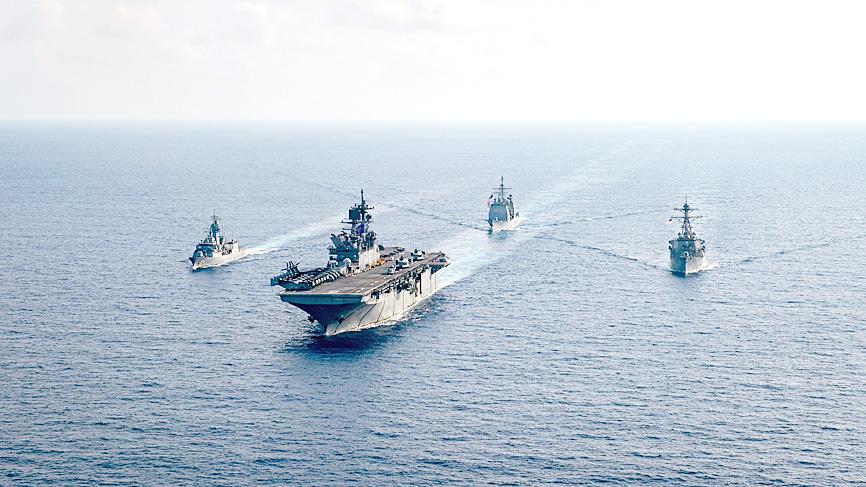The US is undertaking “strategic planning” with ally Australia to consider potential joint responses to a war over Taiwan, US President Joe Biden’s top diplomat in Canberra said yesterday.
“We’re committed as allies to working together — not only in making our militaries interoperable and functioning well together, but also in strategic planning,” Michael Goldman, charge d’affaires ad interim at the US embassy in Canberra, said in an Australian National University podcast, when asked about a potential role for Australia in a Taiwan contingency.
“And when you look at strategic planning, it covers the range of contingencies that you’ve mentioned, of which Taiwan is obviously an important component,” Goldman added.

Photo: Reuters
While Australia regularly hails its history of being involved in every major US conflict over the past century, it has yet to officially commit to taking part in a potential conflict over Taiwan.
The US also makes no iron-clad guarantees it will come to Taiwan’s defense if China makes good on threats to invade, only agreeing to help its capacity for self-defense.
China has stepped up military exercises around Taiwan over the past few years as Washington bolsters diplomatic ties with Taipei.
The comments risk inflaming US-China relations as Beijing hits back hard over criticism from Western countries over everything from allegations of forced labor in Xinjiang and cracking down on democracy advocates in Hong Kong to increased intimidation of Taiwan.
Chinese President Xi Jinping’s (習近平) government views all of them as “internal matters,” and has begun to lash out at companies that take a position on them.
China has also hit Australia with trade reprisals since Australian Prime Minister Scott Morrison’s government called for independent investigators to be allowed into Wuhan, China, to probe the origins of the COVID-19 pandemic a year ago.
US Secretary of State Antony Blinken this week said that Beijing “apparently helped to write” a WHO report studying the origins of COVID-19.
Goldman, who is heading the embassy until Washington replaces former US ambassador to Australia Arthur Culvahouse, who left in January, also backed up comments by US National Security Council Coordinator for the Indo-Pacific Kurt Campbell.
In a newspaper interview last month, Campbell said that US relations with China would not improve until Beijing stops its economic coercion against Australia.
Other nations including Japan, the Philippines and Vietnam have also been targeted with economic action by Beijing, he said.
“We really can’t expect to have substantial improvements in our relationship with China while it’s holding hostage the economies of our partner nations,” Goldman said.

The Central Election Commission has amended election and recall regulations to require elected office candidates to provide proof that they have no Chinese citizenship, a Cabinet report said. The commission on Oct. 29 last year revised the Measures for the Permission of Family-based Residence, Long-term Residence and Settlement of People from the Mainland Area in the Taiwan Area (大陸地區人民在台灣地區依親居留長期居留或定居許可辦法), the Executive Yuan said in a report it submitted to the legislature for review. The revision requires Chinese citizens applying for permanent residency to submit notarial documents showing that they have lost their Chinese household record and have renounced — or have never

A magnitude 5.6 earthquake struck off the coast of Yilan County at 12:37pm today, with clear shaking felt across much of northern Taiwan. There were no immediate reports of damage. The epicenter of the quake was 16.9km east-southeast of Yilan County Hall offshore at a depth of 66.8km, Central Weather Administration (CWA) data showed. The maximum intensity registered at a 4 in Yilan County’s Nanao Township (南澳) on Taiwan’s seven-tier scale. Other parts of Yilan, as well as certain areas of Hualien County, Taipei, New Taipei City, Taoyuan, Hsinchu County, Taichung and Miaoli County, recorded intensities of 3. Residents of Yilan County and Taipei received

Taiwan has secured another breakthrough in fruit exports, with jujubes, dragon fruit and lychees approved for shipment to the EU, the Ministry of Agriculture said yesterday. The Animal and Plant Health Inspection Agency on Thursday received formal notification of the approval from the EU, the ministry said, adding that the decision was expected to expand Taiwanese fruit producers’ access to high-end European markets. Taiwan exported 126 tonnes of lychees last year, valued at US$1.48 million, with Japan accounting for 102 tonnes. Other export destinations included New Zealand, Hong Kong, the US and Australia, ministry data showed. Jujube exports totaled 103 tonnes, valued at

BIG SPENDERS: Foreign investors bought the most Taiwan equities since 2005, signaling confidence that an AI boom would continue to benefit chipmakers Taiwan Semiconductor Manufacturing Co’s (TSMC, 台積電) market capitalization swelled to US$2 trillion for the first time following a 4.25 percent rally in its American depositary receipts (ADR) overnight, putting the world’s biggest contract chipmaker sixth on the list of the world’s biggest companies by market capitalization, just behind Amazon.com Inc. The site CompaniesMarketcap.com ranked TSMC ahead of Saudi Aramco and Meta Platforms Inc. The Taiwanese company’s ADRs on Tuesday surged to US$385.75 on the New York Stock Exchange, as strong demand for artificial intelligence (AI) applications led to chip supply constraints and boost revenue growth to record-breaking levels. Each TSMC ADR represents